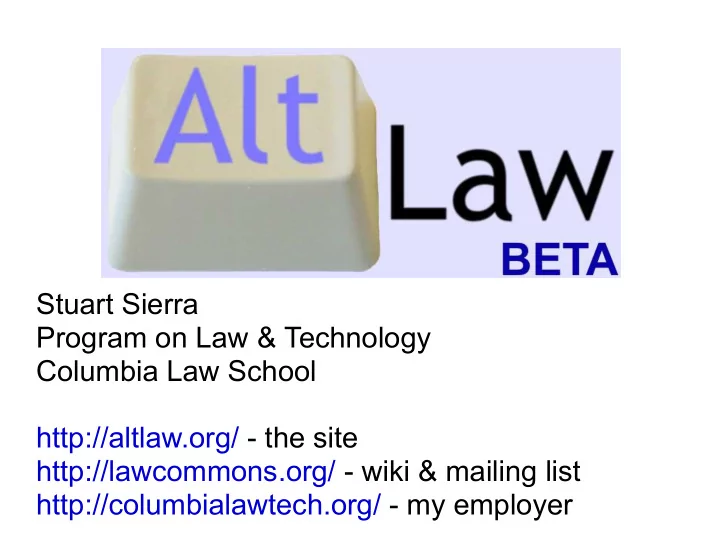

Stuart Sierra Program on Law & Technology Columbia Law School http://altlaw.org/ - the site http://lawcommons.org/ - wiki & mailing list http://columbialawtech.org/ - my employer
Talking Points ● AltLaw – History, motivation – Data sources – Back-end ● Semantic Web – What I've done – What I want – Problems I see
Front-end
Data Sources – Large Corpora ● Paul Ohm's corpus, http://bulk.altlaw.org/ – 7 GB, 200,000+ files harvested from court web sites ● Cornell U.S. Code – 748 MB of XML ● http://bulk.resource.org/courts.gov/c/ – 2 GB, 700,000+ federal cases, XHTML ● http://pacer.resource.org/ – 736 GB, 2.7 million PDFs, 1.8 million HTML files
Data Sources – Court Web Sites www.supremecourtus.gov ● 20-40 new cases daily www.ca1.uscourts.gov ● PDF, WordPerfect, HTML, www.ca2.uscourts.gov www.ca3.uscourts.gov plain text www.ca4.uscourts.gov www.ca5.uscourts.gov www.ca6.uscourts.gov . . . 14 appeals courts total 94 district courts ?? state courts ?? local/other courts
Back-end (1) Large Corpora Common Big Data Daily Crawls Merge Model
Back-end (2) Citation Graph Ranking Clustering Common Enhanced Big Data Common Model Duplicate Data Merge Detection Model Entity Extraction Semantic Analysis
Scaling Stuart ● Java ● ● Ruby ● ● Clojure
The Grand Unified Data Model ● Key-value pairs? (files, Berkeley DB) ● Documents? (Solr/Lucene, CouchDB) ● Trees? (XML, JSON, Objects) ● Graphs? (RDF) ● Tables? (SQL)
● “Disk is the new tape.” – NO random access – NO disk seeks – Run at full disk transfer rate, not seek rate ● Data must be splittable ● Process each record in isolation
Secret Weapons ● Hadoop – open-source MapReduce ● Amazon EC2 – cluster by the hour ● Clojure – Lisp on the JVM ● Solr – full-text search + document storage; no SQL database! ● Ruby on Rails
The Grand Unified Data Model ● Key-value pairs? (files, Berkeley DB) ● Documents? (Solr/Lucene, CouchDB) ● Trees? (XML, JSON, Objects) ● Graphs? (RDF) ● Tables? (SQL)
Mismatch ● Hadoop ● RDF – Disk is the new tape – Normalized – Flat key/value files – Random access – Isolated records – Graph structure ● Solr / Lucene – Linked records – Denormalized – Flat documents
Semantic Web – What I Want ● Publish linked data for others ● Accept new data without writing new parsers/scrapers ● Richer internal data model ● Inference over multiple data sources
AltLaw on the Semantic Web ● Persistent URIs for federal courts – e.g. http://id.altlaw.org/courts/us/fed/app/3 – 303 redirects to HTML/RDF ● Beginnings of an ontology – http://github.com/lawcommons/altlaw-vocab – Extension of Dublin Core & Bibliontology ● Semantic web crawler – Output uses “HTTP Vocabulary in RDF”
Questions ● What's in it for you? – How do you want my data? ● Bulk RDF/XML downloads ● RDFa embedded in HTML ● SPARQL endpoint – What would you do with it? ● What's in it for me? – Universal data model – Less data transformation
Recommend
More recommend